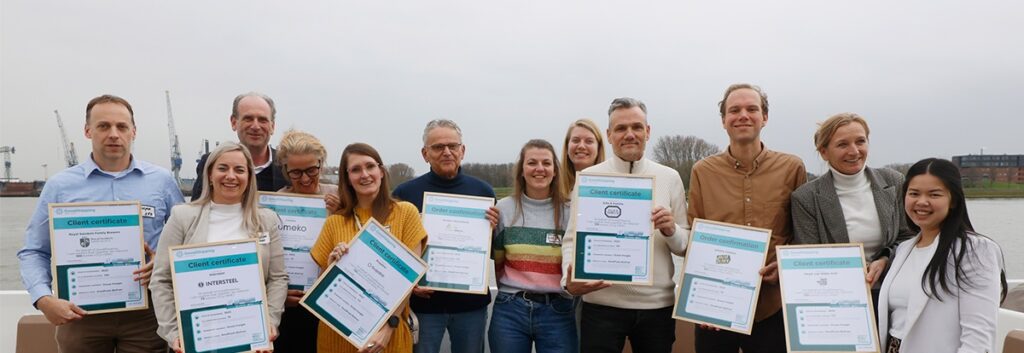
17 companies join campaign to advance sustainable marine biofuel
April 4, 2023
By GoodShipping
 Photo: GoodShipping
Photo: GoodShipping Seventeen companies will together save 2023 tonnes of CO2 this year by providing several vessels owned by shipping company Samskip with sustainable biofuel.
Companies that import or export their freight by vessel generally have little influence on the container shipping company’s fuel choice. GoodShipping aims to change this with the ‘insetting’ concept.
In December, the Port of Rotterdam Authority and GoodShipping announced the ‘Switch to Zero’ campaign to encourage companies to have their sea freight transported using sustainable fuel.
Insetting
Insetting reduces carbon dioxide emissions by using sustainable fuel for shipping. This in contrast to offsetting, which involves CO2 being compensated by, for instance, planting trees. Shippers often transport small numbers of containers on different vessels and can use insetting to reduce a certain amount of CO2 via GoodShipping, which allows for the CO2 neutral transport of cargo. GoodShipping ensures that this CO2 reduction is achieved by providing a vessel with sustainable fuel. This does not need to be the same vessel on which the containers are transported.
This makes it easy for sea freight shipping companies to make a concrete contribution to reducing CO2 emissions. GoodShipping ensures that several Samskip vessels will be provided with biofuels, which will achieve a CO2 reduction of 2023 tonnes. This is comparable to the amount of CO2 released when transporting some 15,000 TEU containers between Rotterdam and Gothenburg.
The participating companies are Dille & Kamille, Swinkels Family Brewers (known for Bavaria and Cornet, among others), Yogi Tea, Beiersdorf, Bugaboo, Otto Group, K2 Forwarding, Yumeko, NINE & Co., De Kleine Keuken, Royal van Whije Verf, Intersteel, OMyBag, Regent Ingredients, Dopper, Johnny Cashew and Anchor International.
Allard Castelein, Port of Rotterdam Authority CEO: “Shipping is not yet on schedule to be CO2 neutral by 2050, even though it is technically feasible. It is therefore good that shipping, as well as industry, in Europe will soon pay for CO2 emissions through the ETS. This encourages sustainability, as it makes environment- and climate-friendly alternatives more attractive financially. However, this is only possible if such alternative options are offered. Therefore, we are working with partners to develop initiatives to help make logistics more sustainable: from battery-powered inland shipping to shore power for sea-going vessels, and from bio-kerosene production for aviation to so-called Green Corridors for sea-going vessels. This initiative with GoodShipping and the 17 companies is part of that programme.”
Dirk Kronemeijer, founder of GoodShipping: “We’ve seen a huge acceleration in the pace of the energy transition brought about by shippers over the past two years, which is why we want to give more companies the opportunity to have their freight shipped sustainably. The offer made by the Port of Rotterdam Authority, which aims to be the world’s most sustainable port, to support us in this was therefore easy to accept. With the Switch to Zero campaign, we’re making it easy for companies to enhance the sustainability of their transport without complex supply chain adaptations.”
Shipping is responsible for approximately three per cent of global carbon dioxide emissions but, at the same time, is a complex sector that fell outside the international climate agreements for a long time. The chain is also fragmented because companies often only ship just a few containers on a vessel.
Print this page